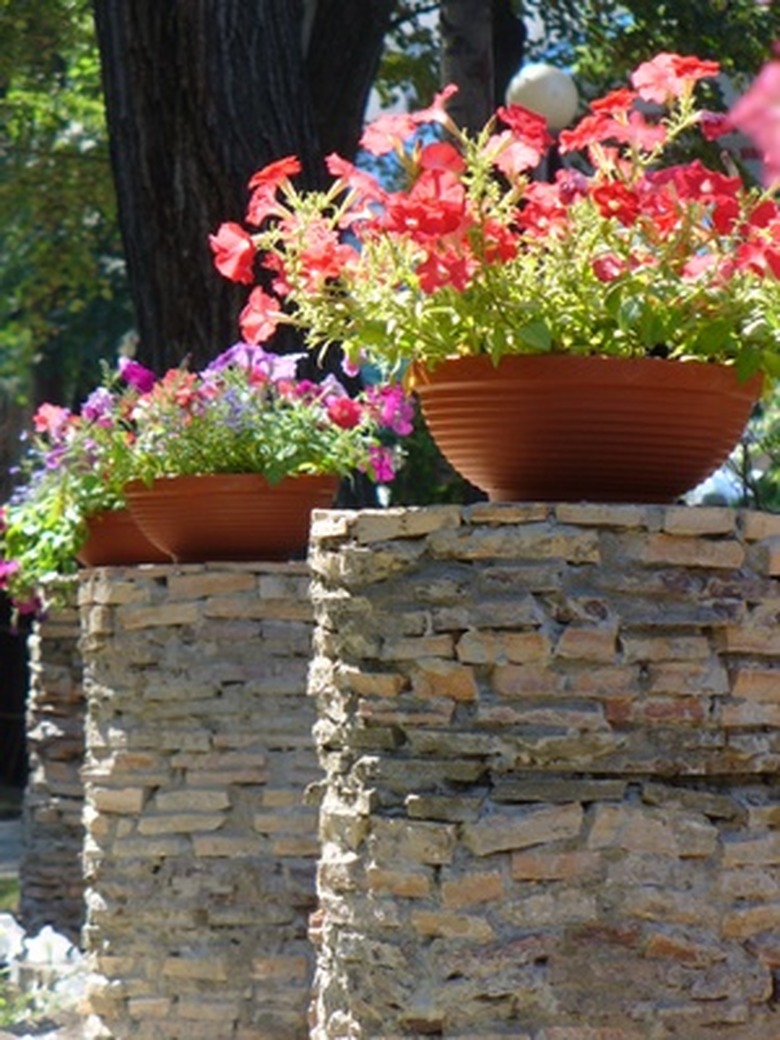Benefits Of Potting Soil
Potting soil serves much of the same purpose as soil in the ground, as it must support the plant and deliver nutrients and water. Good potting soil will bear some resemblance to the plant's native soil. Potting soil must overcome its lack of organisms that transform the soil in the ground. Potting soil must also be light enough to transport and resist compacting.
Convenience
Commercial potting soil is very convenient because all you need to do is open the bag and you will have a mixture that is suitable for your potted plants. You can purchase commercial mixes in different formulas to find the right configuration for your plants. It is also beneficial to make your own potting soil and have it at your disposal any time you need it. This saves on trips to the store when you would prefer to be gardening.
- Potting soil serves much of the same purpose as soil in the ground, as it must support the plant and deliver nutrients and water.
- It is also beneficial to make your own potting soil and have it at your disposal any time you need it.
Weight
A standard loam mix is heavy. This is not much of an issue when you are growing your plants in the ground, but it is very inconvenient to move heavy potted plants from place to place. Commercial mixes routinely include perlite, vermiculite or peat moss to reduce the weight of the soil. Mix your own potting soil and include one of these compounds for a lighter soil. You can also mix organic compost into the soil and it will create air pockets that will reduce the weight of the soil. Organic compost will also add essential nutrients to the soil.
Nutrients
Several brands of commercial potting soil include a fertilizer mixed into the soil. This is a benefit because it helps the plant to grow; however, it is difficult to measure how much fertilizer you are giving to any plant at any one time. If you are a gardener who prefers to keep closer track of the amount and type of fertilizer used on the plants, you will receive greater benefits from mixing your own soil and adding fertilizer separately. Organic material alone may not supply enough nutrients for the plant. In lieu of a chemical fertilizer, water the plant with a compost tea to add nutrients and maintain an organic plant.
- A standard loam mix is heavy.
- In lieu of a chemical fertilizer, water the plant with a compost tea to add nutrients and maintain an organic plant.
Compaction
The majority of potted plants perform best in soil that drains well. Some gardeners add sand to their garden soil to increase drainage. Sand adds too much weight to a potted plant. Increase drainage for the potted plants by increasing the amount of organic material in the pot. There is a good deal of space in organic material that allows air and water to pass through. Perlite, pine bark and coconut coir will help to reduce instances of soil compaction.
Moisture
Potted plants are completely reliant on you for their water. In the absence of rain, plants in the ground can extend their roots downward and outward in search of water. Many higher end commercial mixes include some form of moisture control element. Horticultural vermiculite holds water and makes it available to the plant Add coarse vermiculite to your soil to reduce the frequency with which you water your plants.
- The majority of potted plants perform best in soil that drains well.
- In the absence of rain, plants in the ground can extend their roots downward and outward in search of water.
